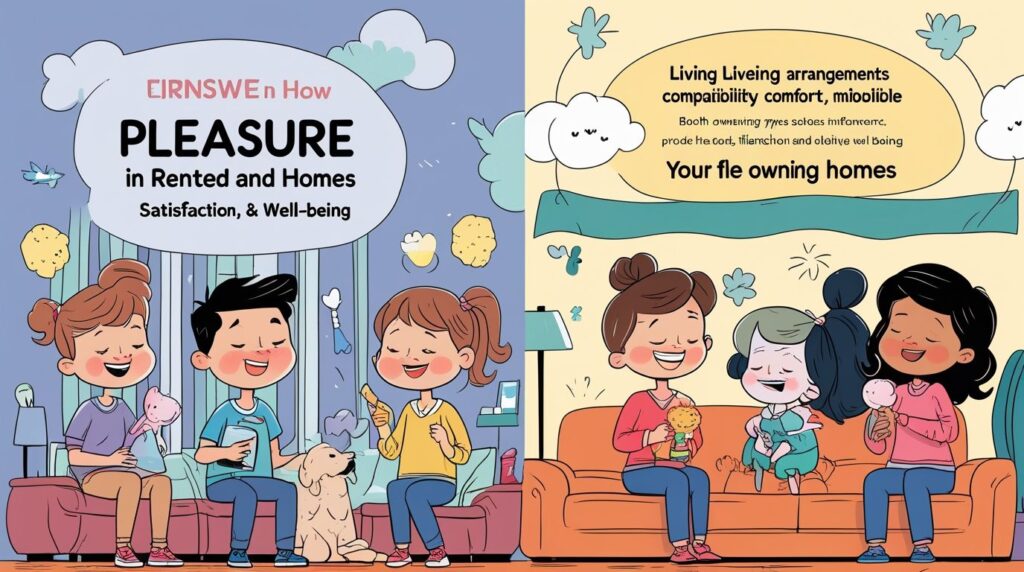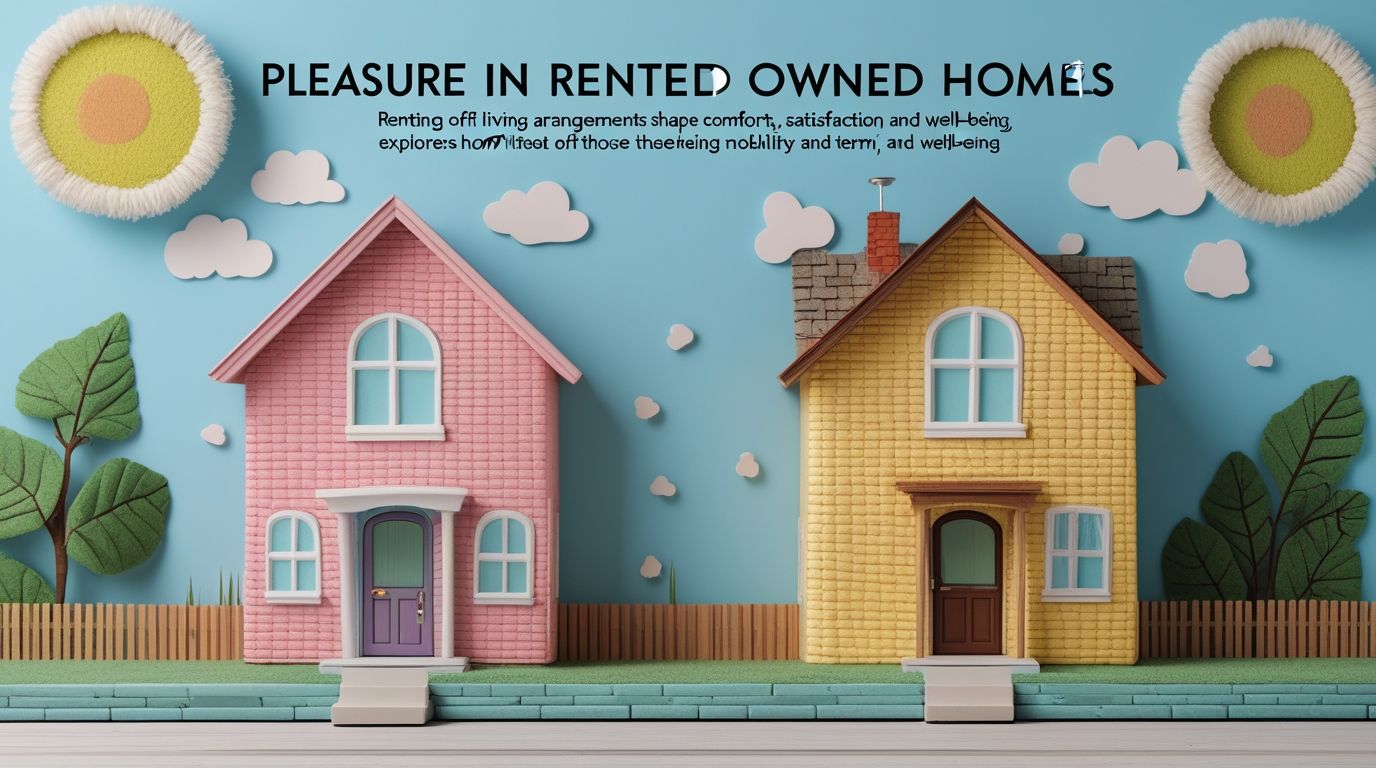Introduction
Pleasure in Rented and Owned Homes, The concept of home is deeply connected to emotions, comfort, and satisfaction. Whether one lives in a rented or owned home, the experience can greatly influence overall well-being and happiness. The pleasure of living spaces is shaped by psychological comfort, social belonging, and financial security. While renting offers flexibility and fewer responsibilities, ownership brings stability, pride, and control. Both housing arrangements hold unique emotional and practical values. Understanding the differences between rented and owned homes helps individuals and policymakers make informed choices. This article explores the pleasure derived from rented and owned homes, comparing financial, emotional, and social factors. It also discusses their broader implications for personal satisfaction, mental health, and community development.
Understanding Pleasure in Rented Homes
Living in a rented home offers distinct advantages and challenges that affect one’s sense of pleasure and stability. Renting provides mobility, allowing people to move easily for jobs or lifestyle changes. This flexibility adds excitement and reduces long-term pressure. Furthermore, financial commitment is lighter since renters avoid large down payments or property taxes. This allows more funds for leisure, travel, or education, increasing life satisfaction. Additionally, renters usually face less responsibility for maintenance, freeing up time and resources. Many rental communities also provide shared amenities that encourage social interaction. This sense of community can foster belonging and emotional comfort. Psychologically, renting can feel freeing since there’s less stress about long-term obligations. However, the temporary nature of rented homes may limit emotional investment, making the experience both liberating and transitional.
Flexibility and Mobility in Renting
One of the major pleasures of renting a home is flexibility. Renters can move without facing the burdens of selling property or dealing with long-term financial commitments. This mobility supports people seeking career advancement, education opportunities, or lifestyle changes. It encourages exploration of new places and cultures, enhancing life experiences. Unlike homeowners, renters can easily adjust their living situations to suit evolving family or financial needs. Such freedom often translates to a sense of independence and adaptability, key factors in psychological well-being. Moreover, individuals in rented homes can experience varied communities, climates, and architectural styles without permanent attachment. This dynamic living experience contributes to personal growth and adventure. Therefore, renting appeals particularly to young professionals, students, and people who value life flexibility over permanence and long-term investment.

Financial Considerations for Renters
Financial freedom is a key source of pleasure in renting. Renters avoid heavy mortgage payments, property taxes, and long-term debts that homeowners often face. This leaves them with disposable income to invest in experiences like travel, hobbies, or further education. The reduced financial burden enhances overall quality of life. Renting also protects individuals from market fluctuations, as they aren’t exposed to property depreciation or maintenance costs. Many renters find relief in predictable monthly expenses and fewer hidden costs. Additionally, since there’s no need for a large down payment, renters can allocate funds toward savings or investments that offer quicker returns. This short-term financial flexibility can be particularly empowering for those in transitional life stages. Consequently, the financial simplicity of renting allows many people to focus on personal growth and leisure rather than long-term debt management.
Maintenance and Responsibility Relief
Another significant benefit of living in a rented home is reduced maintenance responsibility. Home repairs, renovations, or structural issues are typically managed by landlords. This not only saves money but also reduces stress and time consumption. Renters can enjoy their living space without worrying about unexpected repair bills or renovation tasks. As a result, they can devote their energy to career, family, or recreation. For many, this freedom translates into psychological comfort and peace of mind. The absence of maintenance duties also means renters experience fewer interruptions to their daily routines. Furthermore, rental properties often include management services that ensure regular upkeep and safety, enhancing the comfort level. This carefree aspect contributes greatly to the pleasure of renting, as it minimizes burdens associated with property ownership while maximizing convenience and stability in everyday living.
Pleasure in Owned Homes
On the other hand, homeownership offers its own form of deep satisfaction. Owning a home brings a sense of stability, emotional security, and pride. It often represents personal achievement and success. Unlike renting, owning allows individuals to fully control and personalize their space, reflecting their lifestyle and creativity. Moreover, a home is a long-term investment, providing financial benefits like equity growth and property appreciation. This potential wealth accumulation gives homeowners confidence and security for the future. Homeownership also fosters stronger community ties, as people tend to stay longer in one place, participating actively in local activities. Beyond the tangible benefits, owning a home brings psychological comfort—the feeling of belonging and permanence. This section explores how homeownership generates pleasure through stability, creativity, and financial empowerment.
Sense of Stability and Long-Term Investment
A major source of pleasure in owning a home is the sense of stability and security it provides. Unlike renting, homeownership represents permanence and control over one’s environment. Homeowners do not worry about lease renewals, rent increases, or relocation pressures. This stability builds emotional security, fostering long-term peace of mind. Additionally, buying a home is viewed as a long-term financial investment. Over time, property values often appreciate, providing equity growth and potential wealth accumulation. This financial predictability adds to the satisfaction of ownership. For families, a stable home environment supports emotional development and consistency, particularly for children. The connection between homeownership and stability extends beyond finance—it represents a foundation for dreams, relationships, and legacy. Thus, this permanence creates deep, lasting pleasure that renting rarely matches.

Pride and Achievement in Homeownership
Owning a home is often seen as a symbol of success and personal achievement. It reflects years of effort, savings, and dedication. This sense of accomplishment enhances self-esteem and emotional satisfaction. Many homeowners experience joy from the ownership milestone, which represents independence and control over one’s living conditions. Furthermore, a house can become a family’s legacy, strengthening generational ties and cultural identity. The pride of ownership extends to participation in community development and local improvement projects. Homeowners often feel a deeper sense of belonging and responsibility toward their neighborhood. Additionally, personalized design choices—paint colors, gardens, or renovations—allow creative expression, reinforcing pride in the living environment. Hence, owning a home doesn’t only offer financial stability but also fulfills emotional and social aspirations that contribute to overall happiness and life satisfaction.
Creative Expression and Customization
One of the most satisfying aspects of owning a home is the freedom to personalize it. Homeowners can modify, design, and decorate their living spaces according to personal preferences. This creative expression adds joy and meaning to daily living. Whether it’s choosing colors, arranging furniture, or adding extensions, customization allows individuals to reflect their identity and lifestyle. Such creative control is rarely possible in rented properties, where landlord restrictions often apply. Furthermore, homeowners can invest in sustainable features like solar panels or garden spaces, which promote both environmental consciousness and comfort. The process of transforming a house into a home builds emotional attachment and pride. Therefore, customization plays a crucial role in enhancing pleasure and satisfaction in homeownership, blending creativity with comfort and establishing a deeper connection with one’s living space.
Financial Benefits and Equity Growth
The financial pleasure of owning a home extends beyond stability. Homeownership provides opportunities for equity accumulation as property values appreciate over time. Unlike rent payments, mortgage payments contribute toward ownership, building long-term wealth. This gradual equity growth can later support loans, investments, or retirement plans. Furthermore, owning a home offers tax advantages in many regions, which increase disposable income. Homeowners also gain from value appreciation, especially in growing markets. While initial investments are high, the long-term rewards often outweigh short-term financial challenges. The sense of building a personal asset that increases in worth adds confidence and satisfaction. Hence, the financial empowerment associated with homeownership not only strengthens stability but also enhances personal fulfillment, security, and the pride of creating lasting financial value for future generations.
Comparative Analysis: Rented vs. Owned Homes
When comparing rented and owned homes, several differences shape the experience of pleasure and satisfaction. Renting offers freedom, mobility, and reduced responsibility but lacks long-term investment benefits. In contrast, owning a home provides stability, control, and financial growth but demands high initial costs and ongoing maintenance. Emotionally, renters often enjoy flexibility, while homeowners experience pride and belonging. Control over living space differs significantly—homeowners can renovate freely, whereas renters face restrictions. Psychologically, renters may feel lighter due to fewer obligations, while homeowners gain comfort from permanence and achievement. Socially, homeowners tend to form deeper community roots, while renters experience more transient connections. Both housing types cater to different life goals and personalities. Ultimately, pleasure in housing depends on one’s priorities—mobility or stability, freedom or permanence, convenience or investment.
Implications for Policy and Urban Planning
The study of pleasure in rented and owned homes has valuable implications for housing policy and city planning. Policymakers can promote housing strategies that ensure affordability and accessibility across diverse income levels. Encouraging tenure diversity helps meet the needs of both renters and homeowners. Urban planners can design mixed housing models that integrate both rental and owned units, fostering social cohesion and inclusive communities. Moreover, understanding psychological satisfaction can guide the creation of well-planned neighborhoods with green spaces and shared amenities. Such designs improve well-being and community interaction, regardless of tenure type. Finally, researchers can explore the long-term effects of housing stability on mental health and social development. These insights help governments build sustainable housing frameworks that balance flexibility, affordability, and emotional satisfaction.
Conclusion
The pleasure of living in rented and owned homes is shaped by emotional, financial, and social factors. Renting offers freedom, flexibility, and fewer responsibilities, appealing to those seeking mobility and convenience. Conversely, homeownership provides stability, pride, and long-term financial rewards, appealing to those desiring security and permanence. Both living arrangements enrich human experience in different ways. Recognizing these diverse pleasures is vital for individuals making housing choices and for policymakers designing inclusive and resilient communities. Ultimately, whether rented or owned, a home remains a central source of comfort, identity, and happiness, reflecting the universal human desire for belonging and peace.
References
- Clark, W. A. V., & Dieleman, F. M. (1996). Households and Housing: Choice and Outcomes in the Housing Market. Rutgers University Press.
- Gurney, C. M. (1999). Pride and Prejudice: Discourses of Normalization in Public and Private Accounts of Homeownership. Housing Studies.
- Hiscock, R., Kearns, A., Macintyre, S., & Ellaway, A. (2001). Ontological Security and Psycho-Social Benefits from the Home: Qualitative Evidence on Issues of Tenure. Housing, Theory and Society.
- Saunders, P. (1990). A Nation of Home Owners. Unwin Hyman.

3tajay
8o7kvc
crl0kn
je70bb
8i8n7g
lkfgpf
hey there and thank you to your information – I’ve definitely picked up something new from right here. I did alternatively experience some technical points using this site, since I experienced to reload the website many times previous to I may get it to load properly. I were thinking about if your web hosting is OK? No longer that I’m complaining, but sluggish loading cases times will very frequently impact your placement in google and can injury your quality rating if ads and ***********|advertising|advertising|advertising and *********** with Adwords. Anyway I’m adding this RSS to my email and can glance out for much extra of your respective interesting content. Ensure that you replace this again soon..
Informasi akses situs Sigma slot
I really appreciate this post. I have been looking all over for this! Thank goodness I found it on Bing. You have made my day! Thanks again
I am really impressed with your writing skills as well as with the layout on your blog. Is this a paid theme or did you modify it yourself? Anyway keep up the excellent quality writing, it’s rare to see a great blog like this one nowadays..
Hi, just required you to know I he added your site to my Google bookmarks due to your layout. But seriously, I believe your internet site has 1 in the freshest theme I??ve came across. It extremely helps make reading your blog significantly easier.
Thank you for sharing excellent informations. Your website is so cool. I am impressed by the details that you’ve on this web site. It reveals how nicely you understand this subject. Bookmarked this website page, will come back for more articles. You, my friend, ROCK! I found just the info I already searched all over the place and simply couldn’t come across. What a great site.
There is clearly a bundle to know about this. I think you made some nice points in features also.
I like this weblog so much, bookmarked.
whoah this weblog is magnificent i love studying your articles. Keep up the good work! You already know, many people are hunting round for this information, you can help them greatly.
There are certainly a whole lot of details like that to take into consideration. That may be a nice level to convey up. I supply the thoughts above as normal inspiration but clearly there are questions like the one you convey up the place the most important factor will probably be working in honest good faith. I don?t know if best practices have emerged round things like that, however I am certain that your job is clearly recognized as a good game. Each girls and boys really feel the affect of just a second’s pleasure, for the remainder of their lives.
I’ve been following your blog for some time now, and I’m consistently blown away by the quality of your content. Your ability to tackle complex topics with ease is truly admirable.
Thank you for sharing superb informations. Your site is very cool. I am impressed by the details that you have on this website. It reveals how nicely you understand this subject. Bookmarked this website page, will come back for extra articles. You, my friend, ROCK! I found just the information I already searched everywhere and just couldn’t come across. What a great web site.